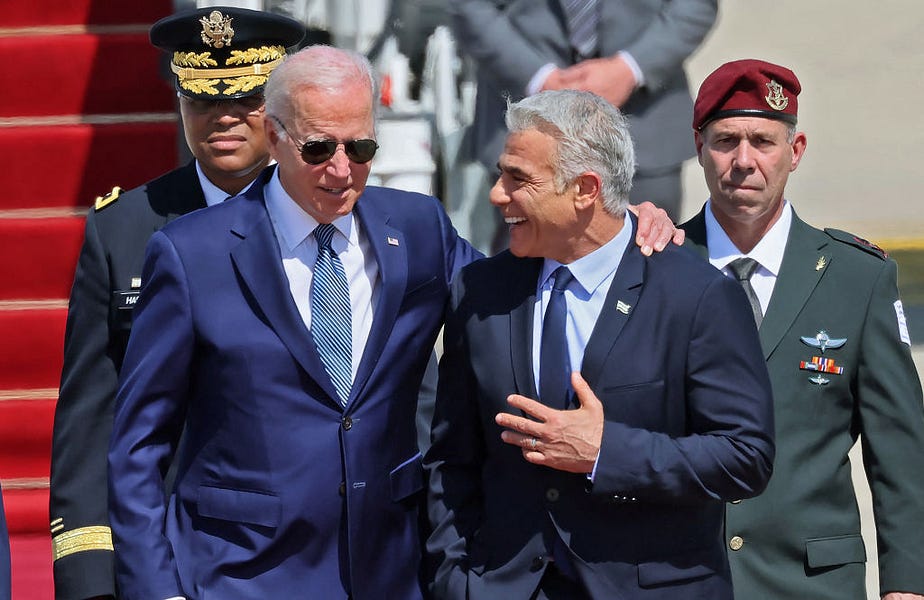On Friday, Joe Biden will become the first U.S. president to travel directly from Israel to Saudi Arabia.
The flight’s scheduled route—from the ancient city of Jerusalem to the coastal metropolis of Jeddah—comes amid profound shifts in the Middle East’s diplomatic and defensive landscape, which increasingly align one-time adversaries in Israel and surrounding Arab countries against common threats posed by Iran. But it also marks a reversal in the Biden administration’s early regional policy, which critics say isolated strategic partners and abandoned Trump-era efforts to foster ties between Israel and its neighbors.
Now, the White House hopes to capitalize on the momentum of Biden’s visit—and the months of behind-the-scenes diplomacy that went into making it happen—to re-center strategic cooperation among the U.S.’s Middle Eastern allies.
One of Biden’s top priorities this week, National Security Adviser Jake Sullivan told reporters Monday, is to “deepen Israel’s integration into the region.” According to recent reporting in several international outlets and by the public admission of American and Israeli officials, the administration’s plans to do so have largely centered on forming an air defense network. In theory, such a pact would encourage Israel and the Arab states—including Saudi Arabia, which hasn’t yet normalized relations with Jerusalem—to work together to counter drone, missile, and rocket attacks from Iran and Iranian-backed groups.
But while the proposed alliance marks a positive step, experts and Middle Eastern officials caution that significant logistical and political roadblocks remain. Overcoming them will require strong U.S. leadership in the region for years to come.
In March, U.S. officials led by then-commander of U.S. Central Command (CENTCOM), Gen. Frank McKenzie, secretly convened several high-ranking military officers from Israel, Saudi Arabia, Jordan, Qatar, and Egypt to discuss strategies for countering Iranian regional aggression. The same month, the Pentagon transferred Patriot missile batteries to Saudi Arabia, walking back its removal of several anti-missile defense systems from the country in September 2021.
Momentum for a defense agreement grew. In May, speaking to an Abu Dhabi-based news outlet, CENTCOM commander Gen. Michael Kurilla called for an “integrated air and missile defense program in support of [Saudi Arabia] and the [United Arab] Emirates (UAE).” Last month, Israeli defense minister Benny Gantz hinted at Israel’s involvement, claiming that the network is “already operative and has already enabled the successful interception of Iranian attempts to attack Israel and other countries.” Speaking to CNBC recently, Jordanian King Abdullah II threw his support behind a “Middle East NATO” without explicitly outlining Israel’s role.
But such an undertaking is easier said than done, experts say. Despite the best efforts of multiple U.S. administrations, the Gulf Cooperation Council (GCC) states—Saudi Arabia, Bahrain, Kuwait, Qatar, and the UAE—have yet to coordinate the anti-missile systems among themselves—let alone pull in Israel. The defensive equipment interspersed throughout the region is produced by different companies and in different countries, making full operational integration difficult.
Even with its warming ties with its Arab neighbors, Israel’s proposed involvement presents additional hurdles to clear. Last year, CENTCOM assumed responsibility for the Pentagon’s defensive relationship with Israel, formally absorbing it into the U.S.’s regional military strategy. Despite its geographic location in the Middle East, Israel had previously fallen under European Command due to opposition from surrounding Arab countries.
For the Gulf states and Saudi Arabia in particular, openly working with Israel on air defense could be politically damaging at home. From the Israeli perspective, the prospect of sharing defensive technology with former adversaries carries its own calculated risk.
“There are a couple of lessons that Israel has learned the hard way over the years,” Jonathan Schanzer, senior vice president of the Foundation for Defense of Democracies, told The Dispatch. “The Israelis had a warm relationship with Turkey and even had some strong military cooperation back in the ‘90s. And then starting around 2002, 2003 with the rise of [Turkish President Recep Tayyip] Erdoğan, things went south very quickly. So military technology is something that I think the Israelis are going to have to be very careful about.”
Issues of spare capacity, training, and maintenance further complicate the push to provide other regional allies with Israeli-made defensive technology. And proposals to somehow link technologically incompatible systems are even more far afield, experts say.
But while military cooperation may not be as drastic as overt weapons transfers, CENTCOM can still maximize the common operating picture by efficiently distributing air defenses deployed to the region. Multi-layered defense systems are typically more effective at intercepting a range of aerial attacks, even if they’re unable to work in concert.
And CENTCOM’s greatest recent success in promoting the shared interests of countries under its purview hasn’t been in air defense, but in naval cooperation.
“The CENTCOM relationship with Israel is evolving and this relationship already involves cooperation with Gulf states. Naval cooperation will be particularly important. We have seen a growing number of Red Sea naval exercises that included multiple regional partners,” Norman Roule, former senior U.S. intelligence official, told The Dispatch. “Although Riyadh doesn’t participate formally in these exercises, Riyadh pays very close attention to their execution and lessons learned.”
Under the CENTCOM umbrella, U.S. officials hope to see strengthened military ties between Israel and its neighbors, even those who don’t formally recognize it. But the administration is also trying to build on the Abraham Accords, a series of landmark agreements normalizing Israel’s relations with the predominantly Muslim countries of Bahrain, Morocco, Sudan, and the UAE. Many Middle East watchers—including 55 percent of Americans—would like to see the Biden administration mediate a similar peace deal between Israel and Saudi Arabia, despite the administration’s initial hostility toward the kingdom.
The U.S.-brokered and Israel-approved handover of two strategically located islands from Egyptian to Saudi control is considered a significant, albeit incremental, step toward diplomatic cooperation. “The coming transfer of the islands of Tiran and Sanafir, located at the entrance to the Gulf of Aqaba in the Red Sea, offers an important opportunity for the Saudis, Israel, and other regional countries to explore their growing relationship,” Roule said. “The development of the islands will touch upon shared environmental, security, and economic goals.” In exchange, the Saudi government is expected to permit overflights by Israeli civilian planes in its airspace.
“The Abraham Accords were built to transcend administrations. Each administration should be working to build on the success of the accords and I am hopeful that the Biden administration will have some success.” Jason Greenblatt, one of the Abraham Accords’ principal architects as the Trump White House’s Middle East envoy and author of the book In the Path of Abraham, told The Dispatch.
“I would like to see President Biden repair the relationship he harmed with the Kingdom of Saudi Arabia, and I would like to see President Biden work closely with Israel, the UAE, Saudi Arabia, and other allies in the region to determine the correct, current approach for the Iranian regime and the severe threat it represents to our friends and allies in the Middle East,” Greenblatt added. “We should be fully focused on the needs of those allies and much less, or perhaps not at all, focused on what the Europeans want.”
Coupled with his icy treatment of Saudi Arabia, Biden’s hurried withdrawal from Afghanistan and diplomacy with the Iranian regime unsettled many of the U.S.’s regional allies in his early days in office. Now, the administration is trying to course correct amid deteriorating indirect negotiations with Iran and new challenges posed by Russia’s war in Ukraine.
“It’s the U.S. policy shift that we’re watching right now that is the most significant,” said Schanzer. “This is the moment where I think Saudi Arabia does have more leverage than it’s had in a while. An acute global energy crisis has a way of sharpening some of the decision-making here in the U.S.”
Sources close to senior Saudi officials told The Dispatch that the kingdom will lobby the U.S. for more concrete commitments to its national security, though it remains unclear what form such assurances would take.
“There has to be something that we are getting out of this, right? We don’t get anything if he’s coming to drink coffee, eat dates, and take a photo—there has to be more than that,” said Faisal J. Abbas, editor-in-chief of Arab News. “One grievance that has been persistent since the Obama era is we don’t want lip service anymore, we want action not words.”
Given past attacks on Saudi Arabia from Iranian-armed groups from multiple directions, the kingdom hopes to see the U.S. take steps to counter Iran’s regional aggression—a priority it shares with Israel and its Arab allies.
In a recent Washington Post opinion piece with the headline “Why I’m going to Saudi Arabia,” Biden vowed to ratchet up economic and diplomatic pressure on Iran to force it into an agreement that curtails its nuclear program. While U.S. officials say they have presented a drafted agreement aimed at returning Iran to compliance with some of the enrichment limits of the 2015 Joint Comprehensive Plan of Action (JCPOA), whether it will accept remains unclear.
“Iran is playing for time,” an Israeli official told the Jerusalem Post. “As long as Iran believes time is on its side, it will not give in or make any concessions. Time has run out [on the 2015 Iran deal], and it is crucial to exert pressure on Iran.”
Perhaps for the first time since taking office, Biden now appears willing to consider alternatives in the event that diplomacy with Iran fails. On Thursday, Biden will reportedly announce a U.S.-Israeli joint declaration committing to use “all elements of national power” necessary to prevent Iran from building a nuclear weapon, Israeli officials told local media. Bolstering formal and informal military cooperation among its allies will be crucial to the U.S.’s deterrence posture in the region.
“The Sunni Arab states and Israel have long shared a common threat picture on Iran,” Roule said. “The evolving security engagements allow these countries to better understand their respective strengths and requirements against a real threat in a complicated international environment.”







Please note that we at The Dispatch hold ourselves, our work, and our commenters to a higher standard than other places on the internet. We welcome comments that foster genuine debate or discussion—including comments critical of us or our work—but responses that include ad hominem attacks on fellow Dispatch members or are intended to stoke fear and anger may be moderated.
With your membership, you only have the ability to comment on The Morning Dispatch articles. Consider upgrading to join the conversation everywhere.